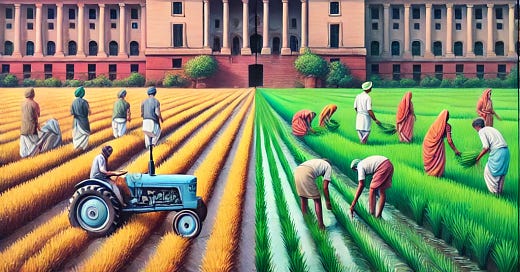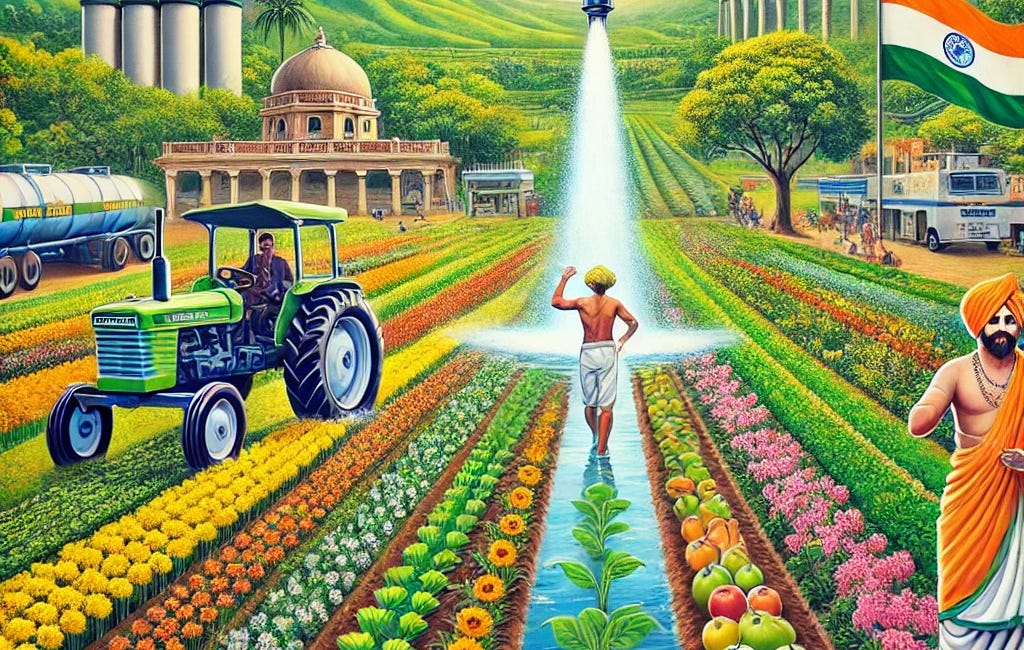Cabinet Approves Rs 14,235 Crore Package for Farmers' Lives and Livelihoods
The bouquet of schemes is designed to supplement, not supplant, the flagship PM-KISAN Yojana.
Cabinet Approves a Package of Seven Major Schemes
The Union Cabinet, chaired by Prime Minister Shri Narendra Modi, today approved a coherent package of seven new schemes aimed at enhancing farmers' livelihoods and increasing their incomes, with a total outlay of Rs 14,235.30 crore. This package is part of the Government’s broader commitment to doubling farmers’ incomes within five years and comes in addition to the existing Pradhan Mantri Kisan Samman Nidhi Yojana (PM-KISAN). Under PM-KISAN, over 14.5 crore farmers receive direct financial support of Rs 6,000 annually, disbursed in three equal instalments through an Aadhaar-verified bank transfer mechanism. This system ensures that funds are transferred directly to the farmers' accounts, eliminating intermediaries and enhancing transparency and efficiency in disbursement.
The package comprises:
1. Digital Agriculture Mission
Based on the structure of Digital Public Infrastructure, Digital Agriculture Mission will use technology for improving farmers’ lives. The Mission has a total outlay of Rs 2,817 crores. It comprises two foundational pillars
1. Agri Stack
Farmers registry
Village land maps registry
Crop Sown Registry
2. Krishi Decision Support System
Geospatial data
Drought/flood monitoring
Weather/satellite data
Groundwater/water availability data
Modelling for crop yield and insurance
The Mission has provision for
Soil profile
Digital crop estimation
Digital yield modelling
Connect for crop loan
Modern technologies like AI and Big Data
Connect with buyers
Bring new knowledge on mobile phones
2. Crop science for food and nutritional security
With a total outlay of Rs 3,979 crore. The initiative will prepare farmers for climate resilience and provide for food security by 2047. It has following pillars:
Research and education
Plant genetic resource management
Genetic improvement for food and fodder crop
Pulse and oilseed crop improvement
Improvement of commercial crops
Research on insects, microbes, pollinators etc.
3. Strengthening Agricultural Education, Management and Social Sciences
With a total outlay of Rs 2,291 Crore the measure will prepare agriculture students and researchers for current challenges and comprises the following
Under Indian Council of Agri Research
Modernising agri research and education
In line with New Education Policy 2020
Use latest technology … Digital DPI, AI, big data, remote, etc
Include natural farming and climate resilience
4. Sustainable livestock health and production
With a total outlay of Rs 1,702 crore, the decision aims to Increase farmers income from livestock and dairy. It comprises the following
Animal health management and veterinary education
Dairy production and technology development
Animal genetic resource management, production and improvement
Animal nutrition and small ruminant production and development
5. Sustainable Development of Horticulture
With a total outlay of Rs 1129.30 crore the measure is aimed at increasing farmers’ income from horticulture plants. It comprises the following
Tropical, sub-tropical and temperate horticulture crops
Root, tuber, bulbous and arid crops
Vegetable, floriculture, and mushroom crops
Plantation, spices, medicinal, and aromatic plants
6. Strengthening of Krishi Vigyan Kendra
With an outlay of Rs 1,202 crore.
7. Natural Resource Management
With an outlay of Rs 1,115 crore.
The Package Supplements, rather than Supplant, the Flagship PM-KISAN Yojana
The newly approved package of seven major schemes is a significant addition to the existing flagship initiatives aimed at uplifting farmers' lives across India, complementing the Pradhan Mantri Kisan Samman Nidhi Yojana (PM-KISAN). It is hoped that the new investments in agricultural education, research, and digital infrastructure will effectively reach farmers in even the remotest corners of the country, rather than remaining as esoteric experiments or research papers that, while valuable for national and international conferences, may have limited practical relevance for farmers. Launched on February 24, 2019, the PM-KISAN scheme has been a cornerstone of the government's efforts to provide direct income support to farmers. Under this central sector scheme, each eligible farmer family receives Rs. 6,000 per year, disbursed in three equal instalments of Rs. 2,000 every four months, directly into their bank accounts through the Direct Benefit Transfer (DBT) mode.
As of the latest data, over Rs. 2.60 lakh crore has been disbursed to more than 11 crore farmers, making PM-KISAN one of the largest DBT programs globally. In the financial year 2022-23 alone, Rs. 58,201.85 crore was allocated, benefiting approximately 8.56 crore farmers as of July 31, 2023. For the Budget 2024-25, an allocation of Rs. 60,000 crore has been made, underscoring the government's commitment to enhancing the financial well-being of around 14.5 crore farmers across the country. This scheme not only aims to supplement the income of farmers but also promotes a productive, competitive, and sustainable agricultural sector. The introduction of the new package of schemes, alongside PM-KISAN, reflects a comprehensive approach to strengthening the agricultural sector, ensuring that farmers receive the support and resources they need to thrive in an ever-evolving agricultural landscape.
In Summary: A Step Forward, But More is Needed
While the new initiatives build upon the foundation laid by the PM-KISAN Yojana and represent a positive step towards improving farmers' welfare, they fall short of addressing the longstanding demand for statutory guarantees on crop procurement, nationwide. This demand, especially vocal in states like Punjab, Haryana, and Western Uttar Pradesh, seeks to ensure that all major crops are procured at guaranteed prices, protecting farmers from the uncertainties of market fluctuations.
In a country where approximately 42.3% of the population—about 58-60 crore people—depend on agriculture and allied activities for their livelihood, and yet the sector contributes only 15% to the national GDP, these new schemes, though significant, are not seen as sufficient by the farming community. It is hoped that the government will soon enact a law to establish statutory procurement guarantees, thereby securing the livelihoods of farmers and their families and strengthening food security for over 80 crore citizens. The agricultural sector’s resilience is vital not only for those who toil in the fields but also for the overall well-being of the nation1.





